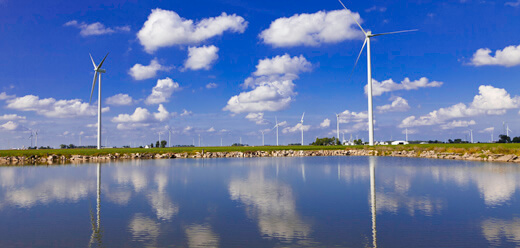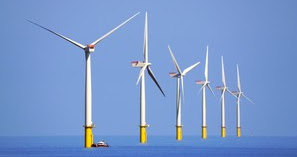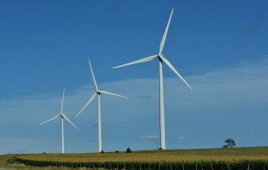You might think that Ohio is not the most forward-thinking state judging by its good wind potential and its legislature’s snub to the wind industry’s readiness to invest in the state. The opposition to wind power is somewhat befuddling considering that the industry would provide significant lease payments to farmers along with welcome tax payments to rural first responders and school districts. One grassroots group in Ohio is trying to change that by working with state legislatures to adjust the setback laws that effectively hobble further in-state wind farm development.

Ohio has managed to build a few wind farms before the recent obstruction efforts. This is the Blue Creek wind farm in Van Wert county.
State Senator Cliff Hite, an Ohio wind advocate, joined several groups on a conference call to discuss recent legislative efforts regarding what can be done to lower the legislative barriers to further development in Ohio. (Editor’s note: Cliff Hite recently retired from the Ohio Senate.)
Hite recognizes that property rights must be respected. “Companies want to build wind projects, so we want to reconsider the overreaching effort that restricts wind farm development,” said Hite. “We have been working on a compromise bill, to get a fair setback law that would protect the rights of both those who do and do not want projects in their communities. I got a super majority of support in the Senate during the last budget process to put the new rule into the budget, but we were stymied by one or two people in the House who just didn’t think the rule should be in the budget. So the less restrictive setback law did not get in the budget but we did get a promise that there would be a look at the possibility of writing a new wind setback law by the end of this fall.”
Hite emphasized that he’s from Finley, Ohio, the home of Marathon Petroleum. “That’s kind of a big deal. We’re not trying to make oil and gas an alternative. We’re trying to supplement it. We’re just trying to open a portfolio in the State of Ohio that includes the resources in the district. And for some inexplicable reason, one of our Cincinnati representatives fought the rule change the most. State Senator Bill Seitz thinks the wind industry is an absolute monstrosity, that it does not work, and that no one wants to promote wind farms. And that is just not true.”

The Icebreaker wind project scheduled for Lake Erie will be on of the first offshore projects in fresh water. The picture is offshore in Europe.
A few people investing in wind have ended up getting a guaranteed price for electric power for 20 years. That is a considerable feat, suggests Hite because no company in the coal, oil, or gas industry can do that. “Banks understand the stable pricing advantage. They’re making the loans to (wind) companies that want to build the wind industry because banks realize that wind is a solid business and that people want its economic development in a particular part of the state.”
The irony of the opposition is that Ohio leads the country in the number of entities or companies that make parts for wind turbines. “Those Ohio firms are selling parts all over the country except to wind farms in Ohio because Ohio’s projects have been stymied. Some will say the wind farms could have been built if they were certified. Some have clamored for quieter turbines with slower rotational speeds. But if you make any of those three changes, that would change their specs and if you change the specs, you can’t be grandfathered into previous policies.”
The law’s language was written, says Hite, in a way that would never allow another project to ever come to Ohio. “That is ludicrous. I’m a member of the Council State Governments. I’m the First Vice Chairman of the Midwest and Legislative Conference. When I met with 11 states and four provinces in Canada competing for wind projects. They almost laughed at us and said, ‘Thank you for your ridiculous laws because we’re all benefiting from them.’ I just don’t understand why there are people that would try to stop $4.2 billion of investments in and around my district. It makes no sense to me.”
One more point, he says. “I’ve got four granddaughters. They are more precious to me than anything in this world. I vowed when I came to Columbus 11 years ago that I would do everything I could to make Ohio better than when I first got here. A reduction in the dependency on fossil fuels is making life better for the people of Ohio. Why that doesn’t catch on with more people, I don’t understand. The wind industry is not a threat. It is a supplemental industry. We’re never going to replace oil and gas in my lifetime. The farmers in my district brag about raising soybeans, corn, and livestock, and they’re proud of their work. But some people do not understand the wind industry. For instance, they talk about noise. And at least in Ohio, the decibel level for a wind turbine must be at a level that is less than a truck that drives by your house. In my district, trucks are driving by people’s houses all the time.”
Hite says experience shows that about 20 to 30% of people have misinformed themselves and will be anti-wind no matter what. “But a large majority support the industry. Some of those supporters are very quiet. They don’t like coming under verbal attack by people who are against it. That’s fine. I get that. They’re humble people.”
He adds that the groundswell of support is amazing in the State. In his district, support comes from the Chamber of Commerce to the Farm Bureau. “We have a lot of big businesses engaging in the wind industry. Fortune 500 companies are saying, ‘We will consider Ohio for investment, but you better have in place an energy policy and some type of renewable portfolio,’ because they’re into wind and solar, as are their stakeholders and stockholders. And they will make their investment elsewhere, but not in Ohio if we don’t change things.”
A listener on the call asked Hite about preparing for meetings with state legislatures.
“I think the most important thing is to arm yourself with accurate information about the projects. Get ready to answer questions such as: Is there a return on investment? Also, what can the wind industry do for my community? Will my roads be torn up or are you going to fix them? Are you going to do something for the community? Do you care about the community? Those are the things that come up all the time.”
Hite recalls a public meeting in which not one person out of 150 spoke out against a wind project coming to that county. Other public meetings have a lot of protest against wind projects, mostly based on misinformation. Here’s the most important thing in Ohio: The law is set up so that instead of paying property taxes, there’s a payment in lieu of taxes, in which the commissioners, if they choose to do this in a particular county, can charge either $7,000, $8,000, or $9,000.00 per megawatt installed. Most everyone is using $9,000.00 as the number.”
That money goes to local schools and commissioners. “It helps them complete projects, such as for bridges or cemetery cleanings. Little projects, big projects, whatever they have. The tax dollars supplement the community income especially the schools in ways that we can’t do at the state level. Our county schools have benefited immensely from the extra payments paid by the wind industry. One little community even asked for a lower tax for its new industries because they had enough money for their plans, but I don’t think that happens very often. Still, I’m all for reducing taxes. That’s a Republican idea, being a Republican.”
Be armed with everything, cautions Hite. For instance, one argument is that wind turbines cause schizophrenia. Some argue that they cause droughts and floods. None of that is true. Ice throw from blades in winter is another. “But the number one complaint from the Blue Creek project in Van Wert County, and there haven’t been many over the last six years, was poorer TV reception because of the wind projects. But that was fixed and everybody is now happy.”
The argument often gets around to subsidies. “Should we pay to get these projects underway? Make sure you have a response. For instance, we’ve subsidized oil and gas since 1916. And if you want to get into a really big fight, talk about how much our federal government spends on our military to protect the sea lanes and land routes that ship oil and gas across countries. Nobody ever talks about that. It’s billions of dollars.”
On the plus side, Hite reports that people tell him their side roads are now better than ever. “I’ve heard that the noise is not a problem. I’ve had one person tell me the ground shakes and the turbines make a lot of noise that keeps this person up all night. I visited the house and couldn’t hear anything. I used my cell phone to record the sound of the supposedly loud blade swoosh that some say was bothersome. But when I played the recording back, you could not hear the wind turbine because of the rustling of the corn I was standing next to.”
Another complaint is that property values will fall. “But that is not true. All you have to do is ask the local real estate agent and he’ll tell you.”
There’s a lot of work involved in these projects when it comes to the negative and you have to be prepared. There are over-exaggerations, misrepresentations, misunderstandings that exist with anything like this. “Understand too that no matter what you say, you won’t change the minds of some people.”
In closing, Hite said, “This is not a right or left issue, it is the right thing to do.” You can hear the entire call at: http://www.powerofwind.org/resources. The password: senatorhite.
Filed Under: Community wind




